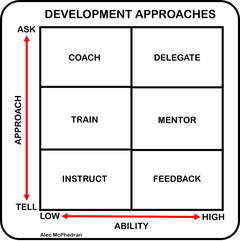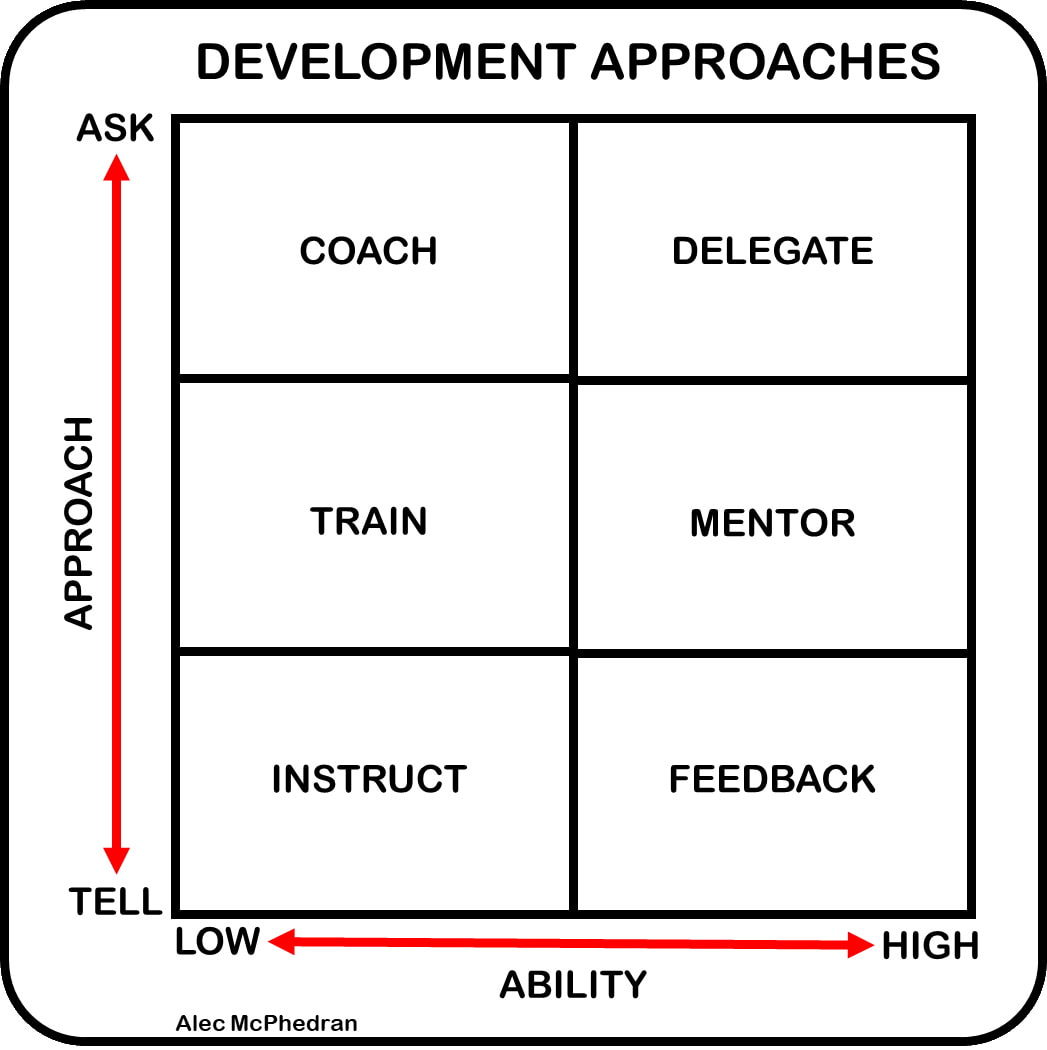 Thoughts on Development Approaches As a professional trainer, of course training works. It is the magic one size fits all Utopia to sort out problem staff. In reality, training perhaps only instructs. It informs people of things they probably already know. So, what do we need to do about it? This article outlines some of the main themes trainer and coach Alec McPhedran covers when supporting managers in understanding people development. There are still a number of people who feel that training is development. Of course, it is part of it but the key focus should be on development. What new knowledge or skills do people need and how can this be achieved? If we think about development in this context, it opens the door to a wide range of development opportunities. This could include shadowing, secondments, coaching, mentoring, buddying and of course, training if appropriate. To explain this, I designed and use the Development Approaches model by way of example. Of course it’s not perfect. It is simply to make a point of considering the most appropriate development approach specific to an individual or teams needs. It does draw from a range of similar concepts such as Hersey and Blanchard’s Situational Leadership or Heron’s Coaching Interventions The model works on two aspects. The first is on how much of the facilitator of the learning tells the individual what to do through to asking them what they think they should do. The second is based on the ability, experience or competence of the individual or team. By thinking about these two aspects, it can contribute to shaping the appropriate development approach. Instruct There are many definitions for instruct but essentially, in the field of learning and development, it is one person telling another through the imparting of their knowledge and experience, hence instruct. Train Training is mainly seen as the organised activity or set of activities aimed at imparting information and/or instruction to improve an individual’s performance or to help them attain a required level of knowledge or skill. It involves a mix of tell and ask and is typically used in introducing new information or skills to a person. Coach Coaching is facilitating the learning of another to help them reach their unique potential. It is guiding the new knowledge and skills through asking questions. This helps the individual explore self-learning under the guidance of another. Delegate Delegation occurs with the assignment of responsibility and authority to a team or team member the power to do a specific activity, project or task with the ultimate responsibility for task completion remaining with the delegator. Within development, this acknowledges their potential or capability and we can explore their approach and thinking through questioning. Mentor Mentoring is a personal developmental relationship in which an experienced person guides, advises and challenges another to discover more about themselves, their capability and their potential. It tends to be more about the person rather than just the knowledge and skills needed for their role. Feedback Feedback is structured information that one person offers to another about the impact of their actions or behaviour. Feedback should ideally be factually based and the person giving the feedback needs to ne clear in what it is they are feeding back on and why. Feedback should be given for positive reasons as well as performance improvement needs. The more able a person, the more they will benefit from honest and factual feedback. The Development Approaches model is simply a discussion tool to explain firstly what development is and secondly, the range of approaches and options available. The Development Approaches Model has been developed by Alec McPhedran Chtd Fellow CIPD, Chtd Mngr CMI, MAC, MCMI as a tool for people who coach or train others; to help understand the range of development opportunities available. Alec is the managing director of Skills Channel TV, the training company for busy creative people. He specialises in one to one coaching, facilitated learning, media training and team development. For further information, contact 0121 366 87 99 or visit www.skillschannel.tv. Copyright © Alec McPhedran 2019
2 Comments
25/10/2019 01:55:57 pm
Like it! Simple and effective way for people to see what works best both from the trainer and the client point of view.
Reply
friend
27/10/2022 09:42:33 pm
Coaching is not only for people with los skills. Coaching is not the opposite of delegate as instruct and feedback. You categories are not at the same semantic level.
Reply
Leave a Reply. |
AuthorA trainer, coach and facilitator helping people acheive. Archives
November 2023
Categories
All
|


 RSS Feed
RSS Feed
